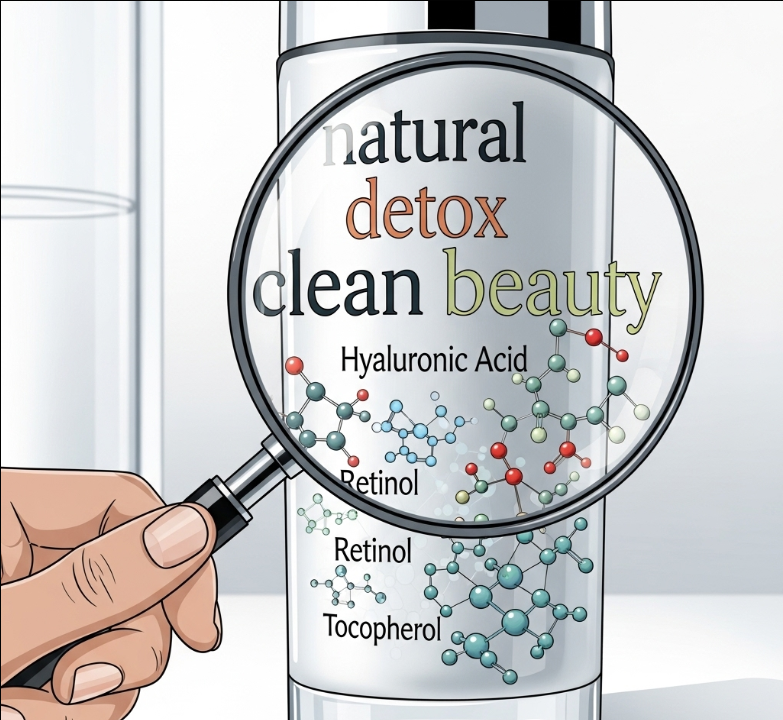
Decoding the Deceit: 5 Marketing Buzzwords in Skincare You Should Stop Believing
TrueBliss SkincareThe skincare aisle can feel like a labyrinth of promises. Every product claims to be "revolutionary," "transformative," or packed with the "latest breakthrough." While innovation is exciting, the beauty industry is also notorious for its clever marketing tactics, often leveraging vague, enticing buzzwords that sound scientific and beneficial, but ultimately mean very little for your skin.
It’s time to become a savvier consumer. Understanding these deceptive buzzwords will empower you to make informed decisions, invest in products that truly work, and avoid falling for marketing hype. Let's decode five common skincare buzzwords you should approach with a healthy dose of skepticism.
1. "Detox" / "Detoxifying"
What it sounds like: A magical purge for your skin, drawing out all the bad stuff and leaving it pure and refreshed, much like a juice cleanse for your body.
The reality: Your skin is an organ of elimination, but it doesn't "store" toxins in a way that requires a special "detox" mask or cleanser to pull them out. Your liver and kidneys are the body's primary detoxification organs. While certain ingredients like charcoal or clay can absorb excess oil and surface impurities (which is a form of cleansing), they are not "detoxifying" your skin from deep-seated toxins.
What to look for instead: Products that focus on gentle, effective cleansing, antioxidant protection (to fight environmental damage), and strengthening the skin's natural barrier. These are the real ways to help your skin maintain its health against daily aggressors.
2. "Natural" / "All-Natural"
What it sounds like: Pure ingredients, straight from the earth, free from any chemicals or artificial components, inherently safe and superior.
The reality: This is one of the most unregulated and misleading terms in the industry. There's no legal definition for "natural" in cosmetics.
-
"Natural" doesn't always mean safe or effective: Poison ivy is natural, but you wouldn't put it on your face. Many potent natural ingredients (like essential oils) can be highly irritating for sensitive skin, especially in high concentrations. Conversely, some "synthetic" ingredients are identical to their natural counterparts (e.g., synthetic vitamin C) and can be more stable and effective.
-
"Natural" can still contain processing: A "natural" extract has still undergone processing to get into your cream.
-
"All-natural" is often a fallacy: Almost all cosmetic formulations require some form of preservative (natural or synthetic) to prevent bacterial and fungal growth, which is essential for product safety.
What to look for instead: Transparency. Focus on brands that provide full ingredient lists and explain their sourcing. Look for certifications from reputable organizations if "organic" or "vegan" are important to you, as these often have clearer guidelines. Understand that a blend of well-chosen natural and safe synthetic ingredients can create the most effective and stable products.
3. "Clean Beauty"
What it sounds like: A modern, ethical approach to beauty that uses only safe, non-toxic ingredients, free from any harmful chemicals.
The reality: Similar to "natural," "clean beauty" is an unregulated term with no universal definition. What one brand considers "clean," another might not.
-
"Free-from" lists vary wildly: Every brand creates its own "blacklist" of ingredients it avoids, often capitalizing on public fear of chemicals (chemophobia) without scientific basis. Ingredients like parabens, silicones, and sulfates are frequently targeted, despite extensive research supporting their safety in cosmetic formulations at regulated levels.
-
Fear-mongering: This buzzword often thrives on creating unnecessary fear around safe, effective ingredients, pushing consumers towards alternatives that may be less stable, less effective, or even irritating.
What to look for instead: Ingredients you understand and that are backed by science to address your specific skin concerns. Don't rely on a "clean" label; instead, educate yourself on common ingredients and choose brands that prioritize efficacy and scientific rigor over vague claims.
4. "Hypoallergenic"
What it sounds like: This product will not cause allergic reactions or irritate your skin, making it perfect for sensitive individuals.
The reality: The term "hypoallergenic" simply means that a product has been formulated to contain fewer common allergens or irritants. However, it doesn't guarantee that a product is 100% free of allergens or that you personally won't react to it. There's no standardized test or regulation required to label a product as "hypoallergenic."
What to look for instead: If you have sensitive skin or known allergies, always check the full ingredient list for specific triggers. Perform a patch test before applying a new product all over your face. Look for products that are fragrance-free (as fragrance is a common irritant) and have minimal, recognizable ingredient lists.
5. "Non-Comedogenic"
What it sounds like: This product will absolutely not clog your pores or cause breakouts.
The reality: While "non-comedogenic" indicates that a product's ingredients have been tested and shown not to clog pores in a lab setting, this doesn't guarantee it won't cause breakouts for your skin.
-
Testing limitations: These tests are often performed on animal skin or in controlled environments that don't perfectly replicate the complex ecosystem of human skin, especially for those prone to acne.
-
Individual skin differences: Everyone's skin reacts differently. An ingredient that is non-comedogenic for one person might still trigger breakouts for another, depending on their skin type, genetics, and other products in their routine.
What to look for instead: If you're acne-prone, look for this label but understand it's a guideline, not a guarantee. Pay attention to how your skin reacts to new products. Prioritize formulas that are lightweight, oil-free if you have very oily skin, and contain active ingredients known to combat acne (like salicylic acid) if that's your primary concern.
Empowering Your Skincare Choices
Navigating the skincare landscape requires a critical eye. By understanding that many marketing buzzwords are designed to appeal to emotions rather than deliver concrete benefits, you empower yourself to make smarter choices. Focus on comprehensive ingredient lists, scientific evidence, and how your skin truly responds to products, rather than falling for the latest "miracle" claim. Your skin will thank you for it!
